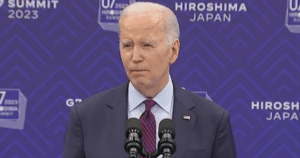Biden Faces Critical Decision On Nippon Steel's $15 Billion U.S. Steel Acquisition
The future of a major international steel merger rests in the hands of President Joe Biden, with a looming deadline that could seal the fate of a $15 billion acquisition bid by Nippon Steel for U.S. Steel.
According to Reuters, President Joe Biden has a 15-day window to decide on a contentious $15 billion merger between Nippon Steel and U.S. Steel, opposed by both the outgoing and incoming U.S. presidents.
The Committee on Foreign Investment in the United States (CFIUS) could not reach a consensus on the bid, prompting the referral to President Biden. This decision comes at a crucial time just as President-elect Donald Trump, who opposes the deal, prepares to take office on January 20.
Complex Dynamics As Biden Reviews Steel Merger Proposal
CFIUS, a panel that assesses foreign investments for national security implications, forwarded their indecision to the President after extensive deliberations. If President Biden does not reject the proposal within the specified timeframe, the merger could proceed by default.
Officials from Nippon Steel and U.S. Steel were informed about the referral last Tuesday, with plans to finalize the merger by the end of 2024. This strategic move by Nippon Steel aims to enhance their global steel production capacity significantly.
Should the merger fail, Nippon Steel faces a substantial financial penalty, with $565 million due to U.S. Steel, highlighting the high stakes involved in this international deal.
Biden and Trump Share Opposition to Nippon Steel's Plans
Both President Biden and President-elect Trump have expressed opposition to the merger, citing significant concerns over national security and economic impact, particularly in Pennsylvania where U.S. Steel is headquartered.
The United Steelworkers Union, representing steel industry employees, also opposes the merger, reflecting widespread domestic concern over potential job losses and reduced production capacity.
In response to national security worries highlighted by CFIUS, Nippon Steel has proposed including U.S. citizens in top management and board positions at U.S. Steel, hoping to mitigate these concerns.
Legal Threats and National Security at Stake
Despite these proposed compromises, CFIUS's August letter expressed that the merger could adversely affect the supply chain for critical steel projects in the U.S., thereby posing a national security risk.
Nippon Steel countered these concerns by arguing that their investments would actually increase U.S. Steel's output and support critical infrastructure projects. They even accused the Biden administration of exercising "impermissible influence" over the CFIUS review process, threatening legal action if the deal is blocked.
The debate continues as both sides present their arguments. Nippon Steel asserts that their plan will bolster both U.S. national and economic security, appealing directly to President Biden to approve the transaction.
Uncertainty Looms Over Presidential Decision
As the deadline approaches, the outcome of this international deal becomes more uncertain. Nick Wall, an M&A expert at Allen & Overy, commented on the unpredictability of Biden's decision, highlighting the complex interplay of legal, economic, and political factors that the President must consider.
White House spokeswoman Saloni Sharma stated, "We received the CFIUS evaluation and the President will review it," underscoring the administration's careful approach to this significant decision.
With a decision due soon, the implications for the U.S. steel industry and international trade relations hang in the balance, making this one of the most watched decisions in the closing days of Biden's administration.



